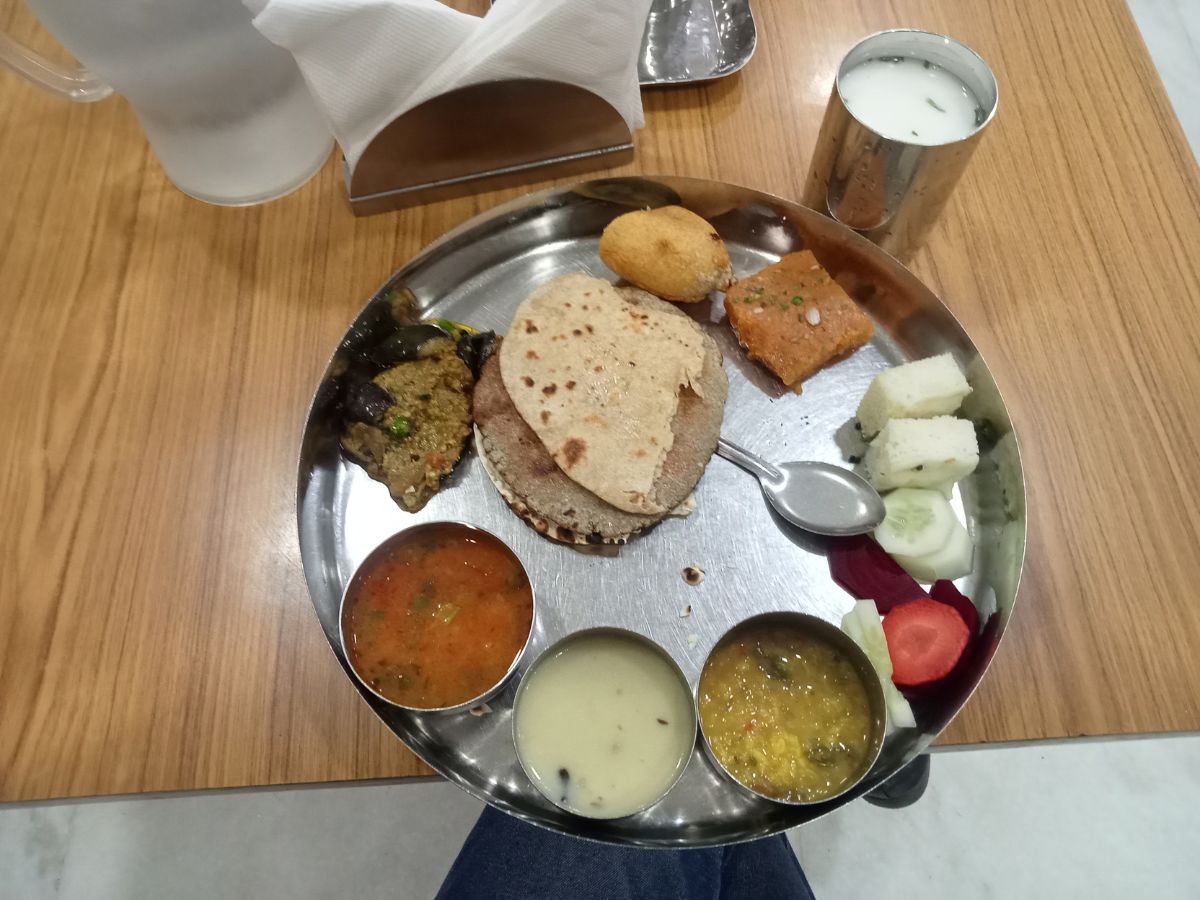
TASTE AND COLOURS: A special thali of Gujarat Bhawan canteen includes three dishes, salad, sweets, and variety of rotis
State houses in Delhi are the best places to savour the authentic regional food away from home. The varieties of menu in these bhawans (houses) also represent the diverse eating habits of the Indian population. From buffalo meat to prawns, regional vegetable recipes to biryani, traditional sweets to varieties of drinks, all can be found in these state houses that offer food at cheap prices and add to the experience of living in a country as diverse as India. While some of them have a meat item as must, others are completely vegetarian. However, one thing remains the same despite diversity: authentic taste and hospitality.
The restaurant of Gujarat Bhawan, located on the Akbar Road, is known for its thalis that contain more-than-expected amount of food that can fulfil a ravenous appetite. As one enters the Gujarat Canteen, a cheerful eating area awaits.
The tables are at a metre’s distance from each other and a TV is located in the centre where old movies are played for entertainment. The overall atmosphere is welcoming, and there are waiters everywhere ready to serve with a genial smile. As is the case in all the state houses in the capital, one can ask for as many refills as one needs. However, what makes Gujarat Bhawan special is the keenness with which waiters serve to satisfy your Gujarati palate!
The menu is divided into two categories: special thali which costs Rs 220 and normal thali which costs Rs 180. Special thali includes one vegetable, lentils, two other regional dishes, salad, papad, sweets, rice and a special drink, mostly chhass (buttermilk). However, the dishes on the menu change every day.
When Patriot visited the place, special thali included masala baigan (fried brinjal), mixed lentils, Gujarati kadhi (a sweet curry made of curd and gram flour), aloo onion, green salad, chili pakora, white dhokla, mohanthal (a traditional sweet made from gram flour, sweet, ghee, complemented by nuts), papad and chhass (buttermilk). This was served with two types of flatbread: roti made of flour and bakhri, a flatbread made from different types of millets such as jowar, bajra and ragi.
Sometimes, they are replaced by puri or thepla (flatbreads made with spices, herbs, yogurt, whole wheat flour and millet flours). Waiters offered Gujarati khichdi a few minutes after the meal was served.
Special thali differs from normal thali simply because of the absence of sweets in normal thali. Other ingredients remain the same. The sweets vary with every meal of the day and usually include gaajar ka halwa, rasgulla, mohanthal, churma laddo – depending on the season. A traditional Gujarati item such as dhokla, khandvi, khaman are mandatory snacks in the thali.
“We design the menu on a daily basis. It is mandatory to include at least three types of sabji and a traditional Gujarati snack. Suppose today, we have mohanthal as sweet, we will not want to repeat it and offer rasgulla or gaajar ka halwa tomorrow. Sweet mostly depends on the season and the availability of its ingredients. Breakfast usually has one sweet and something south Indian too, such as masala dosa or idli-sambhar,” says Upendra Singh, the senior in-charge of the canteen.
The canteen usually receives 150-200 people for a meal, apart from the officials residing in the state house.
“A lot of local residents come to visit us and we also see a number of people coming from other states,” informs one of the waiters of the canteen.
Almost all the chefs working in the canteen come from the state of Gujarat to add the flavours of the region. Hygiene is a priority and maintained throughout the process, from cooking to the serving of food.
In breakfast, sabji-puri remains the constant on all days with one sweet such as fafda jalebi. Apart from beverages such as tea and coffee, milk is also popular among visitors.
Gujarati food is known for its light sweetness and it is tinged with spices as per the dish. For non-Gujaratis, it may taste a bit unconventional. However, once you get acquainted with the taste, you cannot stop but ask for more. Many visitors in the area were from outside Gujarat and loved the Gujarati food.
“I visit the place often. In the beginning, the food may taste a bit different to what we are used to, but I love the sweets and the varieties offered at such a cheap price. Now, I am quite used to it and look forward to eating here once in a while,” says Rajesh, a resident of west Delhi.
One could spot as many families as individuals in the canteen. In a way, the eatery serves as a go-to place for middle-class Gujarati families residing in the national capital.
The state house has 78 rooms and facilities like lounges, a multi-purpose hall, a business centre, a yoga centre, a gym, a terrace, a garden, and a souvenir shop that has been opened to promote Gujarati artisans by making handicrafts and loom products available to Delhi residents.
It serves as a residence for government officials such as the governor, chief minister, the chief justice and judges of the Gujarat High Court, MPs, MLAs, elected public representatives, the chief secretaries, and other senior officers when they visit New Delhi.
On the principle of 'Sarvajan Hitaya, Sarvajan Sukhaya' -- Welfare for all, Happiness for all…
With hundreds reported missing in Delhi this year, this guide explains how families can use…
The case came to light after a 35-year-old woman from Panipat alleged that she had…
During the investigation, CCTV footage helped identify the suspects, according to Delhi Police
The launch took place during the inauguration of the Delhi Police Exhibition Hall at Connaught…
The 28-year-old factory owner was taken to Satyawadi Raja Harish Chandra Hospital in Delhi, while…